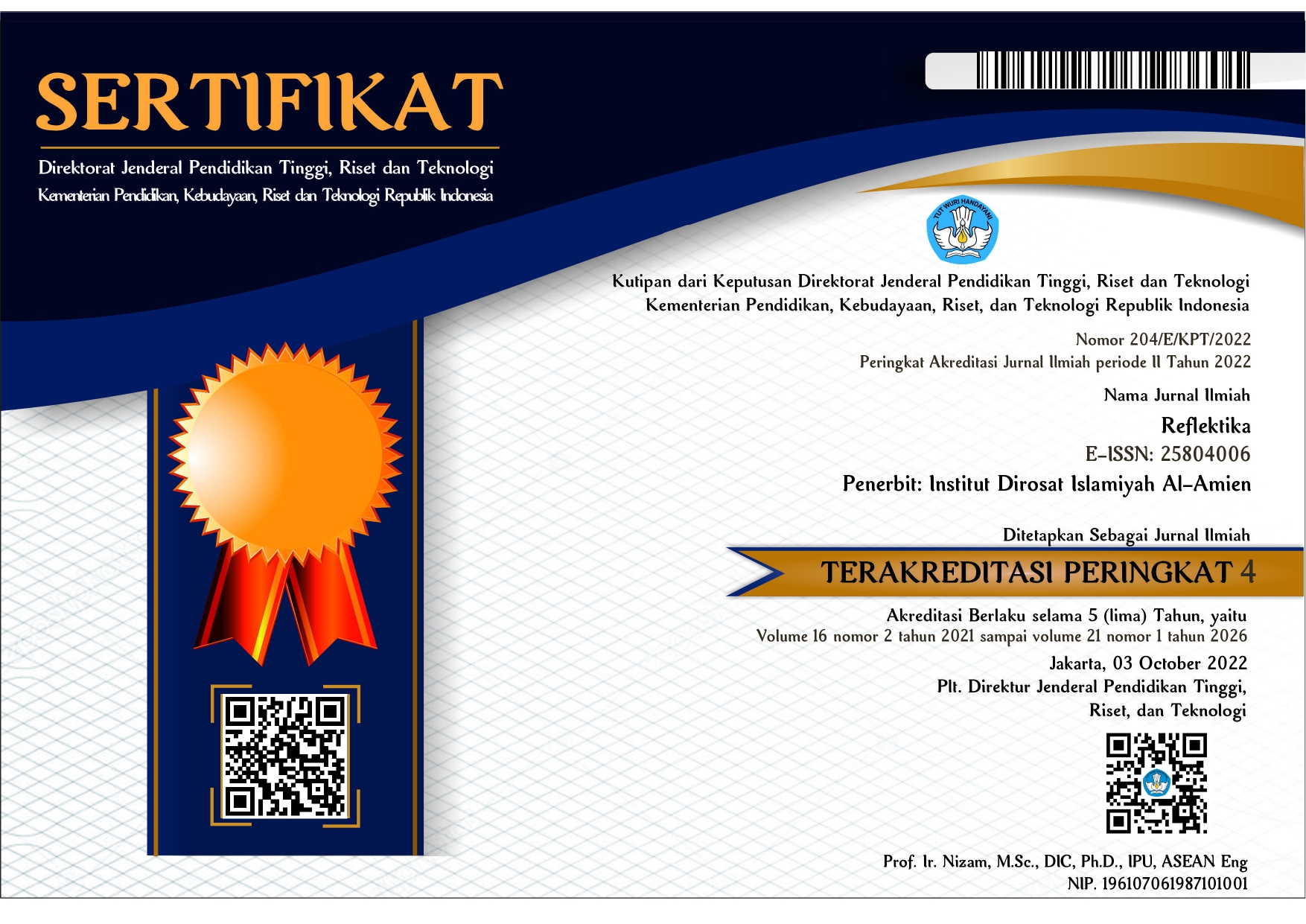ISLAMISASI KONSEP KEBAHAGIAAN MENURUT BARAT
Abstract
Abstract
The concept of happiness is a complex concept among experts who measure the well-being of a person's life, in terms of their happiness and life satisfaction. Of course, Western and Muslim philosophers have many differences of opinion in various aspects, including in the field of science. because of the difference in their worldview that distinguishes the understanding between philosophers. The purpose of this research is to incorporate the Islamic worldview into aspects of science so as to be able to present insight and knowledge and become an acceptable psychological solution, not only accepted by Muslims but also acceptable to the general public. The type of research in this study uses qualitative research methods using a literature study approach. The results of this study indicate that the Islamic worldview in achieving happiness, religion directs humans to have the primacy of reason and intellect. The virtue of reason encourages humans to think and learn many things, reason is also the one who can think about the great favours he receives from God, the glory and the invaluable height so that he is free from humiliation and part of the perfection of reason is his preference for choosing noble behaviour. humans must optimise their minds and always maintain sincerity of heart, and strive to always put their trust in God. So, if a person has the pleasure of doing good because of his habit and hates disobedience, then he has reached the perfection of physical and mental happiness.
Keywords
References
Adinugraha, Hendri Hermawan, and Mashudi Mashudi. “Al-Maslahah Al-Mursalah Dalam Penentuan Hukum Islam.” Jurnal Ilmiah Ekonomi Islam 4, no. 01 (2018): 63. https://doi.org/10.29040/jiei.v4i1.140.
Afifah, Fitri. “Hubungan Kebermanaan Hidup Dan Konsep Diri Dengan Wellbeing,” no. 8.5.2017 (2022): 2003–5.
Al-Attas, Syed Muhamed Naquib. “Islam-and-Secularism-Attas.Pdf,” 1993.
Fadlullah, Muhammad Endy, and Fathi Hidayah. “TRANSFORMASI PEMIKIRAN AL-GHAZALI DARI KECENDERUNGAN RASIONAL KE SUFISTIK (Telaah Kritis Epistemologi Sejarah Pemikiran).” Ar-Risalah: Media Keislaman, Pendidikan Dan Hukum Islam 18, no. 2 (2020): 379. https://doi.org/10.29062/arrisalah.v18i2.400.
Fatoni, Anwar, Mohammad Ghozali, Mulyono Jamal, and Hendri Setyo Wibowo. “Realita Penerapan Sistem Ekonomi Syariah Di Negara Minoritas Muslim.” Ijtihad : Jurnal Hukum Dan Ekonomi Islam 15, no. 2 (2022): 283. https://doi.org/10.21111/ijtihad.v15i2.5535.
Franz, suseno magnis. “Tokoh Etika Sejak Zaman Yunani Sampai Abad Ke-19,” 1998.
Furqon, Syihabul, and Universitas Gigireun Madrasah. Ibn Sina, Isyarat Dan Perhatian: Metafisika, 2021.
Ihsan, Nur Hadi, and Iqbal Maulana Alfiansyah. “Konsep Kebahagiaan Dalam Buku Tasawuf Modern Karya Hamka.” Analisis: Jurnal Studi Keislaman 21, no. 2 (2021): 279–98. https://doi.org/10.24042/ajsk.v21i2.9636.
Info, Article, and Article History. “Konsep Bahagia Dalam Kitab Kimiyaus Al-Sa ’ Adah Karya Syekh Al-Ghazali Dan Implikasinya Terhadap Pendidikan Islam” 6, no. September (2023): 7330–35.
Ismail bin ’Amr Al-Quraisyi bin Katsir Al-Bashri Ad-Dimasyqi, Imaduddin Abu Al-Fida Al-Hafizh Al-Muhaddits Asy-Syafi’i. Tafs?r Al-Qur’?n Al-Adz?m. Beruet, 1342.
Jaelani, Aan. Sejarah Pemikiran Ekonomi Islam. Aksarasatu, 2018.
KHAKIM, B, and S A Rizka. “Minimnya Minat Masyarakat Bermitra Dengan Perbankan Syariah Dan Formulasinya Di Indonesia,” 2022.
Kurniawan, Erwin. “Penurunan Kesejahteraan Akibat Covid-19.” Jurnal Pustaka Mitra 1, no. 2 (2021): 60–67.
Moleong, Lexy J. Metode Penelitian Kualitatif. Bandung: Remaja Rosda Karya, 2000.
Mukrimaa, Syifa S., Nurdyansyah, Eni Fariyatul Fahyuni, ANIS YULIA CITRA, Nathaniel David Schulz, ?. ????, Tukiran Taniredja, Efi Miftah. Faridli, and Sri Harmianto. “Konsep Bahagia Menurut Ibn al Haytam.” Jurnal Penelitian Pendidikan Guru Sekolah Dasar 6, no. August (2016): 128.
Muslih, Mohammad, Amir Reza Kusuma, Ryan Arief Rahman, Abdul Rohman, and Adib Fattah Suntoro. “Mengurai Disrupsi Paham Keislaman Indonesia Dalam Perspektif Tipologi Epistimologi Abid Al-Jabiri.” Jaqfi: Jurnal Aqidah Dan Filsafat Islam 6, no. 2 (2021): 125–40.
Mutawali Muhammad. “Epistemologi Hukum Islam Dan.” Schemata 6, no. August (2017): 141–54.
Nufi Mu’tamar Almahmudi. “Konsep Kesejahteraan Dan Implementasinya Dalam Perspektif Hukum Islam.” Khuluqiyya: Jurnal Kajian Hukum Dan Studi Islam 1, no. 2 (2019): 1–19. https://doi.org/10.56593/khuluqiyya.v1i2.35.
Nuruddaroini, M A S, and H S Midi. “Integrasi Konsep Kebahagiaan Perspektif Psychological Well Being Dan Sa’adah (Studi Komparasi Antara Konsep Barat Dan Islam).” Prosiding Konferensi Integrasi Interkoneksi Islam Dan Sains 3 (2021): 83–87.
Pangestutiani, Yuni. “SEKULARISME” 6, no. 2 (2020): 1–14.
Perguruan, D I, and Tinggi Dalam. “(Laporan Hasil Penelitian Cluster Penelitian Pengembangan Pendidikan Tinggi Tahun Anggaran 2022 Sumber Pembiayaan Blu),” 2022.
Ruggeri K, Garcia-Garzon E, Maguire Á, Matz S, and Huppert F. “Well-Being Is More than Happiness and Life Satisfaction: A Multidimensional Analysis of 21 Countries. Health and Quality of Life OutcomesHealth and Quality of Life Outcomes [Revista En Internet] 2020 [Acceso 4 de Julio de 2021]; 18(1): 1-16.,” 2020, 1–16.
Sabjan*, Muhammad Azizan. “The Meaning And Experience Of Happiness In Islam An Overview,” 2019, 396–402. https://doi.org/10.15405/epsbs.2019.09.44.
Safitri, Nadia, and Idrus Al-Kaf. “Konsep Kebahagiaan Menurut Al-Ghazali Dalam Kimiya As-Sa’Adah Dan Relevansinya Terhadap Rumah Tangga.” EL-FIKR: Jurnal Aqidah Dan Filsafat Islam 2, no. 2 (2021): 39–57. https://doi.org/10.19109/el-fikr.v2i2.10837.
Sholawati, Richma, Nilna Fauza, and Moch Zainuddin. “Pengelolaan Dana ZIS Untuk Meningkatkan Kesejahteraan Mustahik Dalam Mewujudkan Sustainable Development Goals ( SDGs )” 1, no. 2 (2022): 522–41.
Sukmasari, Dahliana. “Konsep Kesejahteraan Masyarakat Dalam Perspektif Al-Qur’an.” At-Tibyan 3, no. 1 (2020): 1–16. https://doi.org/10.30631/atb.v3i1.15.
Syekh Az-Zarnuji. “Terjemah Ta’lim Muta’allim, Terj. Abdul Kadir Al-Jufri,” 2009.
Uswatunnissa, Nisrina, Nurul Hidayah, and Aisyah Rahmawati. “Risalah : Jurnal Pendidikan Dan Studi Islam Konsep Kebahagiaan Dalam Perspektif Sufisme Klasik Dan Modern” 9, no. 2 (2023): 831–39.
Utri, Endrika Widdia. “Konsep Bahagia Dalam Prespektif al Farabi.” THAQAFIYYAT 1, no. 3 (2018): 1–13.
Yaqzhan, Jurnal, Cep Gilang Fikri Ash-shufi, Padjadjaran Islamic Thought, Agus Mulyana, Universitas Darussalam Gontor, and Psikologi Barat Modern. “Afektif Dalam Pandangan Psikologi Barat Modern Dan Konsep Mu ??sabah Imam Al- Muh?sib? Comparative Study Between the Concept of Afective Happiness in the View of Modern West Psychology and the Concept of Mu ??s Abah Imam Al- Muh?sib?” 7, no. 1 (2021): 1–15.
Yunadi, Ahmad. “Kajian Ekonomi Syariah Perspektif Filsafat Islam.” JESI (Jurnal Ekonomi Syariah Indonesia) 12, no. 1 (2022): 77. https://doi.org/10.21927/jesi.2022.12(1).77-89.
DOI: 10.28944/reflektika.v19i1.1606
Refbacks
- There are currently no refbacks.


.png)

